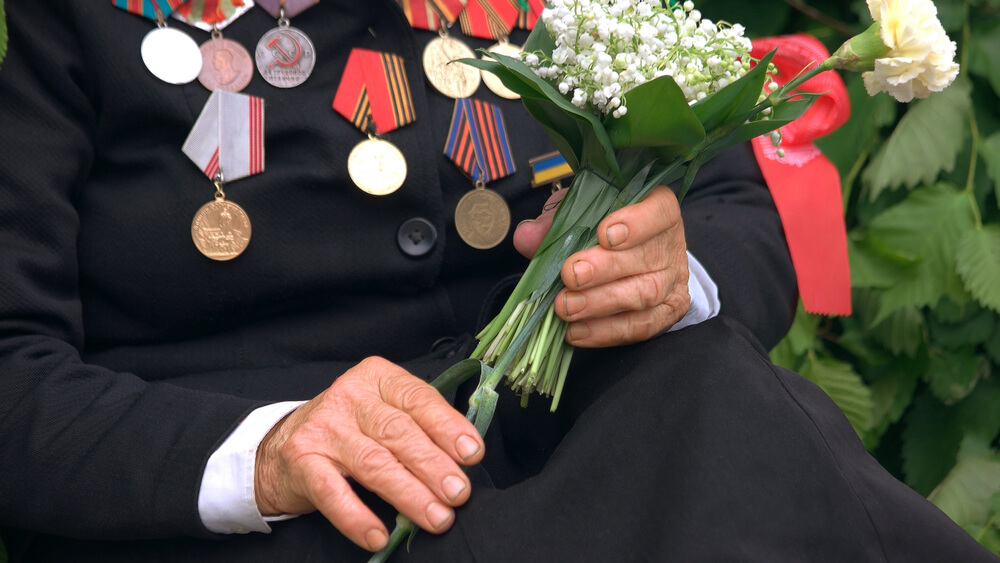'It's not a woman's business - to hate and kill': piercing memories of women who went through the war
'09.05.2020'
Source: Fit4brain
These are the memoirs of women veterans from Svetlana Aleksievich’s book “The War Does Not Have a Female Face” - one of the most famous about the Second World War, where the war was first shown through the eyes of a woman. The book has been translated into 20 languages and is included in the school and university programs. Excerpts from it were published by the portal. Fit4brain.

“Once at night, a whole company conducted reconnaissance in battle on a section of our regiment. By dawn, she moved away, and a moan was heard from the neutral band. Remained wounded. “Do not go, they will kill,” the fighters did not let me in, “you see, it is already dawning.” Did not obey, crawled. She found the wounded man, dragging him for eight hours with a belt around his hand. Dragged alive. The commander found out, announced in haste five days of arrest for unauthorized absence. And the deputy commander of the regiment reacted differently: "Deserves rewards." At nineteen I had a medal “For Courage”. At nineteen, she turned gray. At nineteen, in the last battle both lungs were shot through, the second bullet passed between the two vertebrae. My legs paralyzed ... And they considered me dead ... At nineteen ... My granddaughter is now like that. I look at her and I do not believe. Child! ”
“And when he appeared the third time, this is one instant - it will appear, it will disappear,” I decided to shoot. It was decided, and suddenly such a thought flickered: this is a man, although he is an enemy, but a man, and somehow my hands began to tremble, trembling, chills started throughout my body. Some kind of fear ... Sometimes in a dream this feeling returns to me ... After plywood targets it was difficult to shoot a living person. I see him in the optical sight, I see well. It’s like he’s close ... And inside of me something resists ... Something does not give, I can not decide. But I pulled myself together, pulled the trigger ... Not immediately, we succeeded. It’s not a woman’s business to hate and kill. Not ours ... I had to convince myself. Persuade…"
“And the girls rushed to the front voluntarily, but the coward himself will not go to war. They were brave, extraordinary girls. There are statistics: casualties among front-line physicians took second place after casualties in infantry battalions. In the infantry. What is, for example, pulling a wounded man from the battlefield? We went on the attack, and let's mow us with a machine gun. And the battalion was gone. Everyone was lying. They were not all killed, many wounded. The Germans beat, they did not stop the fire. Quite unexpectedly for all, one girl jumps out of the trench first, then the second, third ... They began to bandage and drag the wounded away, even the Germans were numb for some time with amazement. By ten o’clock in the evening, all the girls were seriously injured, and each saved a maximum of two or three people. They were awarded sparingly; at the beginning of the war, awards were not scattered. It was necessary to pull out the wounded along with his personal weapons. The first question in the medical battalion is: where is the weapon? At the beginning of the war he was lacking. Rifle, machine gun, machine gun - this also had to be dragged. In the forty-first one, an order was issued number two hundred eighty-one on the presentation for rewarding for saving the lives of soldiers: for fifteen seriously wounded taken out of the battlefield with personal weapons - the medal "For Military Merit", for saving twenty-five people - the Order of the Red Star, for the salvation of the forty - the Order of the Red Banner, for the salvation of eighty - the Order of Lenin. And I described to you what it meant to save at least one in battle ... From under the bullets ... "
“I was thrown by a hurricane against a brick wall. I lost consciousness ... When I came to, it was already evening. She raised her head, tried to squeeze her fingers - they seemed to be moving, barely barely tearing her left eye and went to the department, all covered in blood. In the corridor I meet our older sister, she did not recognize me, she asked: “Who are you? Where from? " She came closer, gasped and said: “Where have you been for so long, Xenia? The wounded are hungry, but you are not. ” They quickly bandaged his head, his left hand above the elbow, and I went to get dinner. His eyes were dark, sweat was falling in hail. Began to distribute dinner, fell. They brought to consciousness, and only heard: “Hurry! Faster! ” And again - “Hurry! Faster! ” A few days later they still took blood for the seriously wounded. ”
“We are very young, we went to the front. Girls. I’ve even grown up for the war. Mom measured on the house ... I grew up by ten centimeters ... "
“Our mother did not have sons ... And when Stalingrad was besieged, they voluntarily went to the front. Together. The whole family: mother and five daughters, and father by this time had already fought ... "
“I remember they let me go on dismissal. Before going to my aunt, I went to the store. Before the war, she was terribly fond of sweets. I say:
- Give me chocolates.
The saleswoman is looking at me like crazy. I did not understand: what are cards, what is a blockade? All the people in line turned to me, and I have a rifle bigger than me. When they were given to us, I looked and thought: “When will I grow up to this rifle?” And all of a sudden they began to ask, all in all:
- Give her some candy. Cut us coupons.
And they gave me. ”
“I left for the front as a materialist. Atheist. She left a good Soviet schoolgirl, who was well taught. And there ... There I began to pray ... I always prayed before the fight, read my prayers. The words are simple ... My words ... One meaning is that I return to mom and dad. I did not know the real prayers and did not read the Bible. No one saw me pray. I am secretly. I furtively prayed. Caution. Because ... Then we were different, then other people lived. You understand?"
“Forms could not be attacked: always in blood. My first wounded was Senior Lieutenant Belov, my last wounded was Sergey Petrovich Trofimov, a sergeant in a mortar platoon. In the seventieth year he came to visit me, and I showed my daughters his wounded head, on which there is still a large scar. In total, out of the fire I took four hundred and eighty-one wounded. One of the journalists calculated: a whole rifle battalion ... They dragged men on themselves, two to three times heavier than us. And they are even more severely injured. You drag it yourself and its weapons, and on it is still an overcoat, boots. Take on eighty kilograms and drag. You’ll lose it ... You’re following the next one, and again seventy-eighty kilograms ... And so five or six times in one attack. And you yourself have forty-eight kilograms - ballet weight. Now I can’t believe it ... "
“Then I became the squad leader. The whole branch of the young boys. We're on a boat all day. The boat is small, there are no latches. If necessary, children can cross the board, and that’s all. Well, how about me? A couple of times I got to the point of jumping right overboard and swimming. They shout: "foreman overboard!" Pulled out. Here is such an elementary trifle ... But what is this trifle? Then I was treated ...
“The gray-haired woman returned from the war. Twenty-one years old, and I'm all white. I was seriously injured, shell shock, I could hardly hear in one ear. Mom met me with the words: “I believed that you would come. I prayed for you day and night. " The brother at the front died. She cried: "Equally now - give birth to girls or boys."
On the subject: World War II spies: women participating in the largest maritime operation in history
“And I’ll say something different ... The worst thing for me in the war is to wear men's underpants. That was scary. And it somehow seems to me ... I will not express myself ... Well, firstly, it’s very ugly ... You are in the war, you are going to die for the Motherland, and you have men's underpants. In general, you look funny. It's ridiculous. Men's underpants then wore long. Wide. Sewed from satin. Ten girls in our dugout, and all of them in men's underpants. Oh my God! In winter and summer. Four years ... Crossed the Soviet border ... They finished off, as our commissar said at political studies, a beast in his own den. Near the first Polish village we were dressed, given a new uniform and ... And! AND! AND! They brought for the first time women's underpants and bras. For the whole war for the first time. Haaaa ... Well, I see ... We saw normal lingerie ... Why don’t you laugh? Crying ... Well, why? "
“At eighteen, on the Kursk Bulge, I was awarded the medal“ For Military Merit ”and the Order of the Red Star; at nineteen, I was awarded the Order of the Patriotic War of the second degree. When a new replenishment arrived, the guys were all young, of course, they were surprised. They are also eighteen to nineteen years old, and they mockingly asked: “Why did you get your medals?” or "Have you been in battle?" Pestering with jokes: “Do bullets pierce the armor of the tank?” I then tied one of these on the battlefield, under fire, and I remembered his last name - Shchegolevatykh. His leg was broken. I impose a bus on him, but he asks forgiveness from me: "Sister, I'm sorry that I offended you then ..."
“As long as he hears ... Until the last moment you tell him that no, no, how can you die. Kiss him, hug: what are you, what are you? He’s already dead, his eyes are on the ceiling, and I’m still whispering something to him ... I’m reassuring him ... Surnames have been erased, they have disappeared from memory, but their faces remained ... ”
“Near Sevsky, the Germans attacked us seven to eight times a day. And that day I still carried the wounded with their weapons. He crawled to the latter, and his arm was completely broken. Dangles on pieces ... On veins ... In bloodshed all ... He urgently needs to cut off his hand to bandage. No other way. I don’t have a knife or scissors. The bag was telepathing, teleporting on its side, and they fell out. What to do? And I gnawed this pulp with my teeth. Gnawed, bandaged ... Bandage, and the wounded: “Hurry, sister. I’ll still fight. ” In a fever ... "
“Men will put out a fire at the bus stop, shake lice, and dry. Where are we? Let's run for some shelter, and there we undress. I had a knitted sweater, so lice were sitting on every millimeter, in every eyelet. Look, it makes you sick. Lice are head, clothes, pubic ... I had them all ... "
“We strove ... We did not want to be said about us:“ Ah, these women! ” And we tried more than men, we still had to prove that no worse than men. And for a long time we had an arrogant, condescending attitude: “These women will fight ...” ”
“Come ... A man of two hundred girls, and behind a man of two hundred men. The heat is worth it. Hot Summer. Throw march - thirty kilometers. The heat is wild ... And after us there are red spots in the sand ... Traces of red ... Well, these things ... Our ... How are you going to hide what? The soldiers follow and pretend that they don’t notice anything ... They don’t look at our feet ... The trousers on us were drying out, as they were becoming of glass. They cut it. There were wounds, and the smell of blood was heard all the time. They didn’t give us anything ... We watched: when the soldiers would hang their shirts on the bushes. A couple of pieces being pulled ... They then already guessed, laughed: “Petty Officer, give us other underwear. Our girls were taken. ” There wasn’t enough cotton and bandages for the wounded ... And not that ... Lingerie, maybe, only two years later appeared. In men's underpants they went and T-shirts ... Well, let's go ... In boots! My legs were fried too. Let's go ... To the crossing, there are waiting for ferries. We got to the crossing, and then they began to bomb us. The bombing is terrible, men - where to hide. Our name is ... But we do not hear the bombing, we are not up to the bombing, we are more likely in the river. To the water ... Water! Water! And they sat there until they got wet ... Under the fragments ... Here it is ... Shame was worse than death. And a few girls in the water died ... "
“We were happy when we got a bowl of water to wash our hair. If they walked for a long time, they looked for soft grass. They tore it and her legs ... Well, you know, they washed it off with grass ... We had our own peculiarities, girls ... The army didn’t think about it ... Our legs were green ... Well, if the foreman was an elderly man and understood everything, he didn’t take extra clothes from the bag, and if he’s young, he’ll definitely throw away the excess. And what is it superfluous for girls who need to change clothes twice a day. We tore off the sleeves from the lower shirts, and there were only two of them. These are only four sleeves ... "
“How did the Motherland meet us? I can’t without sobs ... Forty years have passed, and still my cheeks are burning. Men were silent, and women ... They shouted to us: “We know what you did there!” They lured young men ... our men. Frontline b ... Military knots ... ”Insulted in every way ... The dictionary is rich Russian ... The guy from the dance escorts me, I suddenly feel bad, my heart will rattle. I am going and going and sit in a snowdrift. "What's the matter?" - "Never mind. Natanetsa. ” And these are my two wounds ... This is a war ... But one must learn to be gentle. To be weak and fragile, and the legs in boots were carried - the fortieth size. It's unusual for someone to hug me. I'm used to being responsible for myself. I waited for affectionate words, but did not understand them. They are like children to me. At the front among men is a strong Russian mat. I got used to it. My friend taught me, she worked in the library: “Read poetry. Read Yesenin. ”
“My legs were gone ... My legs were cut off ... They saved me there, in the forest ... The operation was in the most primitive conditions. They put it on the table to operate, and even there was no iodine, they sawed their legs with a simple saw, both legs ... They put it on the table, and there is no iodine. For six kilometers, we went to another partisan detachment to get iodine, and I am lying on the table. No anesthesia. Without ... Instead of anesthesia - a bottle of moonshine. There was nothing but an ordinary saw ... Joiner ... We had a surgeon, he was also without legs, he talked about me, other doctors said: “I bow to her. I have operated on so many men, but have not seen such. He will not cry out. ” I held on ... I got used to be strong in people ... "
“My husband was a senior engineer, and I’m an engineer. Four years in the carriage we went, and the son is with us. I have not even seen a cat in my entire war. When I caught a cat near Kiev, our team was terribly bombed, five planes flew in, and he hugged her: “Sweet Kisanka, I'm glad I saw you. I don’t see anyone, well, sit with me. Let me kiss you. ” Child ... Everything should be childish for the child ... He fell asleep with the words: “Mommy, we have a cat. We now have a real home. ”
“Anya Kaburova is lying on the grass ... Our signalman. She is dying - a bullet hit the heart. At this time, a wedge of cranes flies over us. Everyone raised their heads to the sky, and she opened her eyes. She looked: “What a pity, girls.” Then she was silent for a moment and smiled at us: “Girls, will I really die?” At this time, our postman runs, our Klava, she shouts: “Do not die! Do not die! You have a letter from home ... "Anya does not close her eyes, she waits ... Our Klava sat next to her, opened an envelope. Letter from mom: “My dear, beloved daughter ...” A doctor is standing next to me, he says: “This is a miracle. Miracle!! She lives against all the laws of medicine ... "Read the letter ... And only then Anya closed her eyes ..."
On the subject: 'Night Witches' or 'Dunkin Regiment': the story of the only female regiment of World War II
“My friend ... I will not give her names, she’ll be offended ... The military assistant ... Three times wounded. The war ended, entered the medical institute. She did not find any of her relatives, all died. Terribly poor, soaps at night porches to feed themselves. But she did not admit to anyone that the disabled person had war and had privileges, she broke all documents. I ask: “Why did you break?” She cries: “And who would marry me?” “Well, then,” I say, “I did the right thing.” Cries even louder: “These papers would be useful to me now. It’s hard for me. ” Can you imagine? Crying. "
“Then they began to honor us, thirty years later ... To invite to meetings ... And at first we lurked, even did not carry awards. Men wore, but women did not. Men are winners, heroes, grooms, they had a war, and they looked at us with completely different eyes. Quite different ... We, I tell you, were taken away the victory ... The victory was not shared with us. And it was insulting ... It is incomprehensible ... "
“The first medal“ For Courage ”... The battle began. The fire is heavy. The soldiers lay down. Team: “Go! For the Motherland! ”, And they are lying. Again the team, lie again. I took off my hat to see: the girl got up ... And they all got up, and we went into battle ... "







